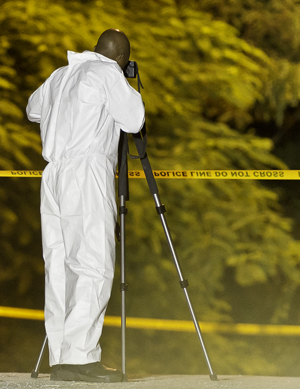OT’s share threat to stability with rising crime
 (CNS): The common problem of rising violent crime across the overseas territories has been front and centre during this week’s attorney generals conference. The top governmentlawyers from the regional territories discussed drugs, gangs, money laundering and the maintenance of law and order, which was seen as a common problem. Gun crime across the Caribbean territories has risen at an alarming rate in the last 12 months, British MP Edward Garnier, QC, the chair of the conference, told delegates, who also heard about the issue of the local shootings here in Cayman and the threat such lawlessness poses to all of the territories. (Photo Dennie Warren Jr)
(CNS): The common problem of rising violent crime across the overseas territories has been front and centre during this week’s attorney generals conference. The top governmentlawyers from the regional territories discussed drugs, gangs, money laundering and the maintenance of law and order, which was seen as a common problem. Gun crime across the Caribbean territories has risen at an alarming rate in the last 12 months, British MP Edward Garnier, QC, the chair of the conference, told delegates, who also heard about the issue of the local shootings here in Cayman and the threat such lawlessness poses to all of the territories. (Photo Dennie Warren Jr)
The combination of violent street crime and sophisticated financial crime means attorney generals and law enforcement officials are forced to fight crime on two fronts, the delegates heard at the conference at the Grand Cayman Marriott Beach Resort this week.
Attorney generals from Anguilla, BVI, Montserrat, Turks and Caicos, Pitcairn and the Cayman Islands have come together to discuss the common issues they face. The conference was chaired by the Solicitor General Edward Garnier as well as other officials from the UK, and the Justice Departments of the US and Canada.
Garnier said the UK’s fundamental policy and objective was to ensure “the security and good governance” of the 14 OTs in the face of the remarkable diversity requiring specifically tailored policies. Colin Roberts, the OT’s director, also spoke about the ongoing consultation for finalising the new UK White Paper for the OTs.
The Cabinet Office has set up a webpage to invite public comment on the Cayman Islands’ relationship as an Overseas Territory (OT) with the UK, as part of an ongoing public consultation exercise launched by the UK. Although the UK has already opened a website portal for people across the territories to comment directly on the future relationship with the UK, the Cayman public can also comment via the Cabinet Office, which has set up the page on its website.
This contains the six main questions for which the UK is seeking responses and which will form part of the position paper that the premier will present at the Overseas Territories Consultative Council meeting in London in late November.
“I urge every member of the public to take this opportunity the UK has provided and speak up. Do visit the webpage and learn for yourselves what the UK is proposing with the new White Paper 2012. It will define the relationship with each of the Overseas Territories since one size cannot fit all,” McKeeva Bush said.
Category: Crime


My concern is the high number of illegal guns in the hands of criminals in a situation such as Cayman suffered after Hurricane Ivan. The potential for anarchic lawlessness is very high. Even after Ivan one felt to be on a bit of a knife edge, until armed reinforcements arrived from Bermuda. I trust the RCIPS has a contingency plan, well oiled, polished and regularly updated.
As it relates to security, when there is a major disaster like hurricane Ivan again the resources of the RCIPS will be stretched, so residents in most cases will initially need to depend upon themselves for personal protection. Residents should expect to experience significant delays when calling “first responders”. There are many legitimate reasons for certain delays. So one of the contingency plans residents should have is what will they do until the RCIPS arrives.
Oh please, we could have had a hold on it in the 90's. But remember McKeeva, "we are peaceful people". We don't have crime nor gangs. Here we are 2011 and we have crime that is being committed by the peaceful people who are gangs……
Most of them have one thing in common. Corrupt politicians from the top and the rest closing their eyes and are afraid to speak. Because……?
Might be time to look at a Caribbean task force shared across the region. Let the local police build the case and gather evidence and send the task force in to do the dirty/dangerous work when needed.